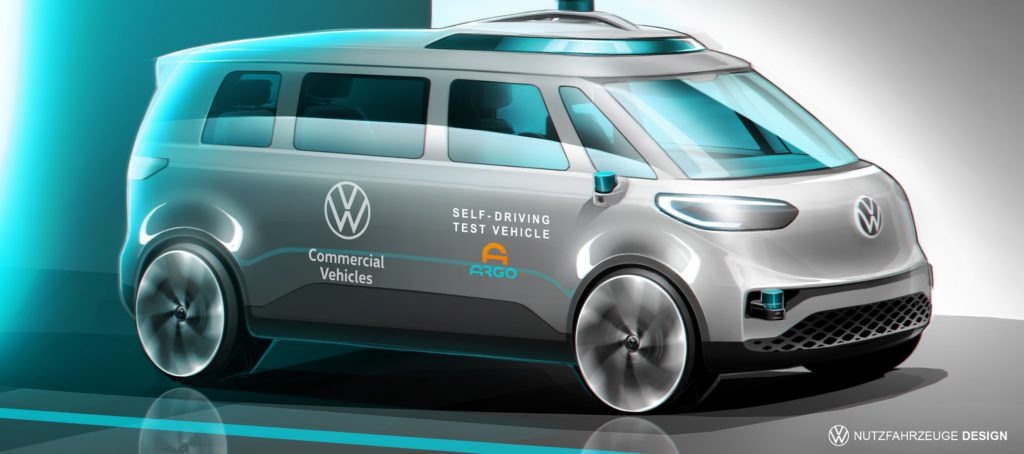VW aims for commercialised autonomous systems in 2025
01 March 2021

Volkswagen Commercial Vehicles (VWCV) is looking to introduce autonomous systems for traffic use in 2025. Set to premiere next year, the ID. Buzz, an electric call back to the carmaker’s campervan, will be the group’s first vehicle to ‘dirve autonomously.’
As the manufacturer focuses on transforming into a ′tech company,’ testing both its electric and autonomous capabilities in the ID. Buzz is a no-brainer. By utilising a commercial setting to spearhead the coupling, VW should understand of how the two systems perform more quickly as commercial vehicles spend so much time on the road.
′With the confirmation of the group’s supervisory board for our Autonomous Driving R&D program, we are setting the course for the future of mobility. Autonomous, electric driving will make an important contribution to urban mobility and road safety. Our vehicles are the logical first choice to apply such systems to,’ said Carsten Intra, CEO of VWCV.
Ride-hailing
Within the larger Volkswagen (VW) Group, VWCV is responsible for developing fully-autonomous systems and commercial applications in urban areas. With the recent budget for autonomous driving confirmed by the group’s Supervisory Board, VWCV will set out to build special-purpose vehicles (SPVs), such as robo-taxis and vans.
This is made possible, in part, by VW’s involvement in Argo AI, a company dedicated to advancing autonomous technology. In June last year, VW closed a $2.6 billion (€2.16 billion) investment in the Ford-owned company. The deal not only granted the German carmaker access to Argo AI’s advanced autonomous systems, but provided an opportunity to ingratiate its own Autonomous Intelligent Driving (AID) into the company.
Christian Senger, Head of #AutonomousDriving: “This year we are conducting field trials in Germany, in which the SDS by @argoai will be used in a version of the future #IDBUZZ by #VWCommercialVehicles.″ #ShapingMobility @VWGroup pic.twitter.com/wpiZYyuFea
″” Volkswagen Commercial Vehicles (@VWCV_official) February 26, 2021
Aside from its work with external companies like Argo AI, VW is also investing billions in its own Car.Software Organisation that develops assisted and automated-driving functions up to SAE level 4 for the private-mobility sector. The carmaker’s software arm recently confirmed it would be collaborating with Microsoft to build a cloud-based automated-driving platform through its Azure software.
Moulding mobility solutions
′This year, for the first time, we are conducting field trials in Germany, in which the self-driving system by Argo AI will be used in a version of the future ID. Buzz by Volkswagen Commercial Vehicles,’ said Christian Senger, head of autonomous driving.
′The aim is to develop a ride-hailing and pooling concept similar to what MOIA offers today. In the middle of this decade, our customers will then have the opportunity to be taken to their destination in selected cities with autonomous vehicles.’
The autonomous ride-hailing VWCV is proposing is another example of VW’s changing attitude towards mobility. Unleashing WeShare in Hamburg, establishing a mobility system on the Greek island of Astypaleathea, and launching an electrically-chargeable vehicle (EV) pilot with Uber, the carmaker is clearly positing itself to get ahead of a changing market.
While electric and autonomous systems are a huge technological step forward for the automotive industry, it does not come without a price. This coincidentally, is a far heftier price tag than OEMs have to attach to new models as they attempt to offset serious R&D costs. While the costs of a brand-new battery-electric vehicle (BEV) might put some consumers off outright purchase, introducing BEVs in the form of a robo-taxi or shared-mobility solution means greater accessibility and consumer exposure, which might not have been achieved otherwise.